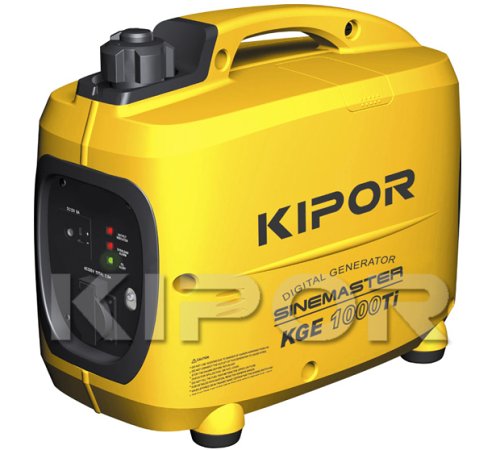 KIPOR Sinemaster Generators are the latest rave. The second most popular brand generators in all of Europe for the past 6 years running, Kipor is a well established generator manufacturer of over 15 years and is one of the world's leading manufacturers of digital generators. These high quality generators are getting great reviews and are a fraction of the price of the competition. Just introduced to the United States market this year we are very excited to be one of the few places to be selling these high quality, reliable, super quiet, super lightweight generators. All Kipor generators sold by MCE International are backed by a 2 Year consumer use manufacturer's warranty. For more detailed product information and technical specifications visit the RaceDayAccessories website.
KIPOR Sinemaster Generators are the latest rave. The second most popular brand generators in all of Europe for the past 6 years running, Kipor is a well established generator manufacturer of over 15 years and is one of the world's leading manufacturers of digital generators. These high quality generators are getting great reviews and are a fraction of the price of the competition. Just introduced to the United States market this year we are very excited to be one of the few places to be selling these high quality, reliable, super quiet, super lightweight generators. All Kipor generators sold by MCE International are backed by a 2 Year consumer use manufacturer's warranty. For more detailed product information and technical specifications visit the RaceDayAccessories website.Customer Review: Great Little Generator
This is a very good little generator for the price. It runs very smoothly if you give it good gasoline. I've found that adding a little STP gas booster makes it run really great. I recommend this for any generator. I also use Mobile 1 synthetic oil (5-40w)which you can get at Wal-Mart in 5 quart jugs. It is truck/SUV rated oil and will keep your generator running smoothly a long, long time. Great on gas under low load. If running near full load in cold weather you'll need to leave the choke on for awhile with the smart throttle off.
There's a multitude of websites that sell solar panels at seemingly inexpensive prices. On some sites, you can purchase enough panels to power your entire home for less than $15,000. Unfortunately, panels aren't the only cost of residential solar power you need to factor into your budget. There's also installation, electrician setup, inverter cost, battery cost and even home owner's insurance cost.
Installation is probably the most important cost you'll put into your system right after the cost of panels. Your panels will run from an average $15,000 - $20,000, and installation around $7,000-$10,000. Installation costs depend on the construction of your roof. If you have a steep roof or Spanish tiles, be prepared to pay a lot more for professional installation. The installation is tricky because your installers have to properly secure the panels while ensuring a leak-proof seal in the roofing system.
Some installation companies prefer to hire an electrician to ensure the wiring between the home and the solar panels is installed correctly. Some may even have a full-time electrician available. While most homes shouldn't need any major electrical changes, if you have an older or historic home, you'll find that some rewiring may need to occur. Hopefully you have invested money into proper wiring before you choose a solar system.
An inverter is necessary for any solar system. The inverter takes the DC power produced by the solar panels and converts it to AC. Most appliances run off AC so for most households it's absolutely necessary. The average cost of an inverter is around $2000, and the cost of installation can run up to $500. Unfortunately, your solar panels will outlast the inverter so be prepared to spend that money again after about 10 years.
If you plan on running your system off-grid, independent of your local electric company, you will have to purchase a battery (or two) to store power on cloudy days and at night. The cost of batteries depend on how much power you want to keep in reserve. In general the battery portion will cost less than $1000 with minimal installation. The battery will have to be replaced every 3-5 years.
Finally, once you have a installed and well-maintained solar system, you want to make sure it's protected. Most homeowner insurance companies will charge around $120 per year to add the solar power system to your policy. This is essential to protecting the investment you've made on your house. An extra $100 or $200 a year is a small price to pay to ensure your $40,000 solar system will outlast any disaster.
A residential solar power system should not be purchased lightly. It's a long-term investment on your home and your lifestyle that should be made chosen carefully. The good news is that even if you finance your solar system, your loan payment will be less than your current electric bill! In the end, you save money when you choose the power of the sun over coal and oil energy.
Philip Richards is all about using solar power at home. Learn how he built solar panels at his house and is saving money with renewable energy. Also you can check out his blog on solar power at http://homesolarblog.com
generac generator












